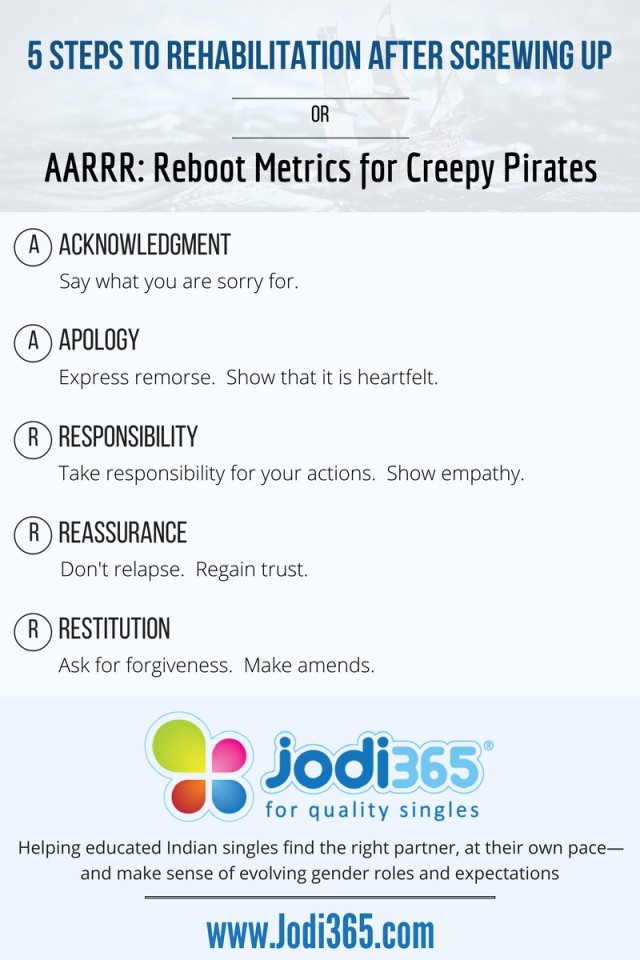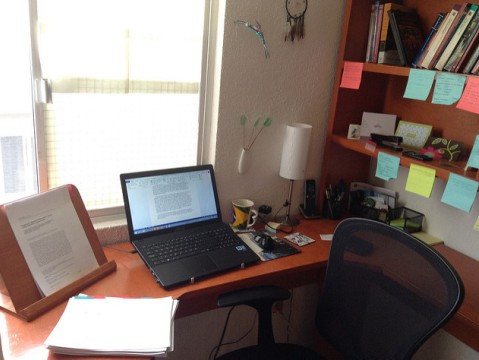Dear Dave McClure:
Please don’t raise your guard. This isn’t a sanctimonious post lecturing you on how you ought to have conducted yourself. (Who am I, an individual with enough flaws of my own, to cast such a stone?) Besides, a lesson that I learned from my parents early on and hope not to forget is, “Don’t kick someone when they are down.”
What this is is a note from a student to a teacher. Call it guru dakshina. (It is tradition, in Indian culture, to express gratitude to a teacher by giving them a gift upon completing a course of study.) Indeed, while we may not know each other, I have learned and benefited much from your writings and recorded lectures over the past decade, especially your AARRR! Guide: Startup Metrics for Internet Marketing and Product Management:
So, in the spirit of reciprocity, here’s a guide that I hope you—why, all of us—find useful when we have done someone wrong, need to do the right thing, and want to grow as individuals.
Apology Lifecycle: 5 Steps to Rehabilitation
A: Acknowledgment
Say what you’re sorry for.
We can’t set things right if we are dismissive of someone’s feelings or, worse, continue to invalidate them. So, give a proper account of the situation, your role in it, and acknowledge the hurt caused or damage done. Tip:
- The creepy way: “Mistakes were made.”
- The right way: “I made a mistake.”
A: Apology
Express remorse. Show that it is heartfelt.
Apologize, sincerely and unprompted by external forces. Not simply because an apology is essential to re-building an important relationship. Not because acting contrite is essential to your rehabilitation.
Also, don’t qualify your apology and don’t make it seem as if the situation has been difficult for you. Tip:
- The creepy way: “This hasn’t been easy for me. Still, if this mess has caused anybody pain, I am sorry.”
- The right way: “I am deeply sorry for causing you pain.”
R: Responsibility
Take responsibility for your actions. Show empathy.
Human behavior may be situational. Yet, as the saying goes, “Don’t ruin an apology with an excuse.” Empathize with the other person and show that you understand the effect your actions may have had on them. Tip:
- The creepy way: “I have been dealing with a lot of stress and just snapped. That wasn’t the real me.”
- The right way: “What I did was wrong and disrespectful. I should not have treated you like that.”
R: Reassurance
Don’t relapse. Regain trust.
Promise—credibly, without going overboard—that your hurtful actions or behavior won’t be repeated and work to keep your word. Without such reassurance, you will not be able to repair strained relationships and regain trust. Tip:
- The creepy way: “I am sorry, but you know how hard it can be for me every time that [excuse of a triggering event] happens.”
- The right way: “It won’t happen again. I promise.”
R: Restitution
Ask for forgiveness. Make amends.
An apology doesn’t warrant automatic or even instant forgiveness. So, don’t take one for granted. Rather, request it and demonstrate a willingness to make amends. Better yet, especially when someone has endured in silence the effects of your wrongdoing, empower them to suggest a corrective course of action. Follow through on the plan. Tip:
- The creepy way: “I hope that we can put this behind us.”
- The right way: “Please forgive me. I am willing to do whatever it takes to set things right.”

There is also hope for redemption. As someone who migrated to the US as a young adult more than 20 years ago and set roots in the country, I have been surprised by how forgiving American society tends to be of those who have “sinned” and then go about genuinely making amends. (I have wondered about John Edwards’ prospects of redemption, though.) If you are sincere about doing right by your family and all the people you have wronged and let down, take heart from this: You could come out of this situation a better person and set an example for the rest of us.
















































